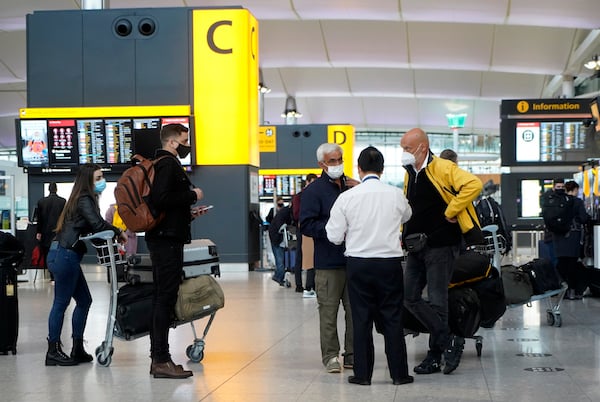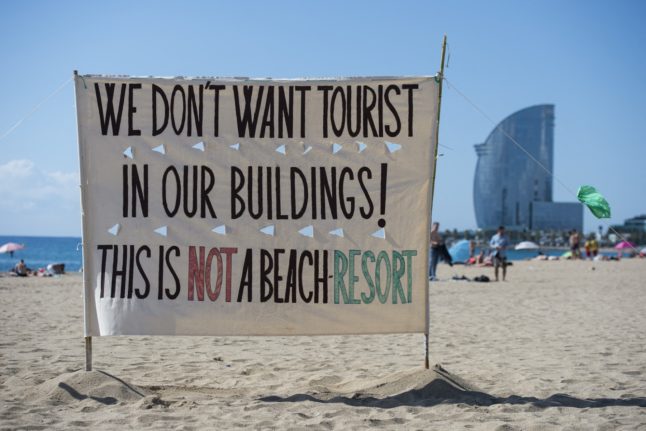Over the weekend, The Local reported that several British residents in Spain were denied boarding by airlines at Heathrow airport in the UK for their flight to return home.
Airline staff from British Airways and Iberia had told passengers that their green residency certificate, which features your NIE number, was no longer valid and that they would only be allowed to fly with a new TIE card as proof of residency.
Both the Spanish Embassy in the UK and the British Embassy in Madrid however have since clarified the situation, confirming that both the green residency certificate AND the TIE is valid for travel for British residents in Spain.
READ MORE: Do Britons returning to EU need to worry if their passport is stamped?
After the incident, the British Embassy in Madrid tweeted: “This should not be happening, the Spanish authorities have reconfirmed again this evening that the green residency document will be valid for travel to return to Spain as stated in our travel advice.”
The Spanish Government also reconfirmed to the British Embassy in Madrid on January 2nd, stating that the green residency document will be accepted for travel to return to Spain.
Brexit: What Brits in Europe need to know about travel from January 2021
Yesterday afternoon January 3rd, the Spanish Embassy in London confirmed this further by releasing the following statement and announcing a grace period for those who have not yet been able to collect their TIEs.
Grace period
“The Embassy of Spain in London would like to clarify:
1. The certificado de Registro de Ciudadano de Union Europea (also known as the ‘green certificate’) and the new ‘Tarjeta de Identidad de Extranjero’ (TIE) are valid proof for residency for a UK nationals who wish to return to their homes in Spain. All travellers must also carry a valid passport.
2. We can also confirm that those UK nationals who can prove that they have started their registration process, but who do not yet have their new TIE card, should be allowed to board flights to return to Spain. The Government of Spain will put in place this measure for a grace period of seven days from January 4th 2021. The document ‘resguardo de solicitud o renovación de tarjeta de extranjero’ can be considered as acceptable evidence’.”
British residents in Spain have been having trouble collecting the new TIE certificates, due to an overload in the system and no appointments available to go and collect it.
The Spanish authorities have also created a printable pdf for British residents to show at the airports, confirming which residency documents are accepted and a photograph of each. It is available to download here.
The Iberia press office told The Local “On January 1st, we received an email from the Spanish border police saying that 'registration as European citizen' was not valid anymore to prove legal residency in Spain, in the case if British people. So, this could not be used to travel to Spain under Covid restrictions.
“But on then on January 2nd, at 7:30pm we received a second email saying that the document could be used if it wasn’t expired. So, it was just a confusion in the communication we received. Happily, it was clarified quickly. We are here to take people to their destinations, so these situations are very unpleasant to all, and specially for our passengers”.
Iberia concluded by saying that as far as they know, this only affected one of their passengers and others that were affected were travelling with other airlines or codeshare tickets.
The problem doesn’t seem to be affecting all flights however. British resident in Valencia Lara Dolden told The Local “I flew with easyJet on Saturday (January 2nd) and didn’t have any problems” and all she had to show were “my green (NIE) residency card, my Covid test results and a form I was given at the airport to fill out at each stage of the journey”.British resident in Spain Ruth Edwards who travelled from the UK to Spain yesterday, January 3rd also tweeted:
Just landed in Malaga from Heathrow. No problems with BA despite worries that our green residency cards might not be accepted due to issues people had yesterday. Feels very strange to be returning not as an EU citizen… pic.twitter.com/5QVEIfV9Iw
— Ruth Edwards (@RuthKEdwards) January 3, 2021
The British Government website currently states: “If you are a resident in Spain, you should carry your residence document (the green paper EU residence certificate or the new TIE), as well as your valid passport when you travel. From January 4th – 10th January inclusive, Spanish authorities have confirmed that a valid “resguardo de solicitud o renovación de tarjeta de extranjero” document will be accepted as evidence for those UK nationals who do not have a TIE card, but have started their Spanish residency process.
The Local contacted British Airways and Iberia for comment on the situation, but as of yet they haven't responded.
Those British residents in Spain who have been denied boarding upon returning home however, should be able to claim compensation from their airline.
Brexit: The two mistakes to look out for on your TIE Spanish residency card
Sue Wilson Chair of the Bremain in Spain group told The Local: “The Spanish authorities, the British Embassy and groups like Bremain in Spain have made every effort to communicate the travel requirements to all concerned. Those refused entry were complying with all that was required and were prevented from travel by those without any real authority to do so.
“It is one thing to have to kerb travel plans to and from the UK due to the pandemic. To limit valuable time spent with family, especially at Christmas, is bad enough, but to then be unable to return home to Spain must have been a frustrating and terrifying experience. It has sent shockwaves throughout the British community here in Spain. Kudos to the British Embassy for their swift action, which will hopefully prevent any repeat of this worrying incident”.
Spain restricted passenger travel from Britain on December 22nd due to the rapid spread of a new coronavirus strain identified in the UK, with exceptions for Spanish nationals and those legally resident in Spain and have now extended the restrictions until January 19th.
There have also been reports of British citizens having similar difficulties trying to return home to other EU countries such as Italy, France and Germany.



 Please whitelist us to continue reading.
Please whitelist us to continue reading.
Member comments